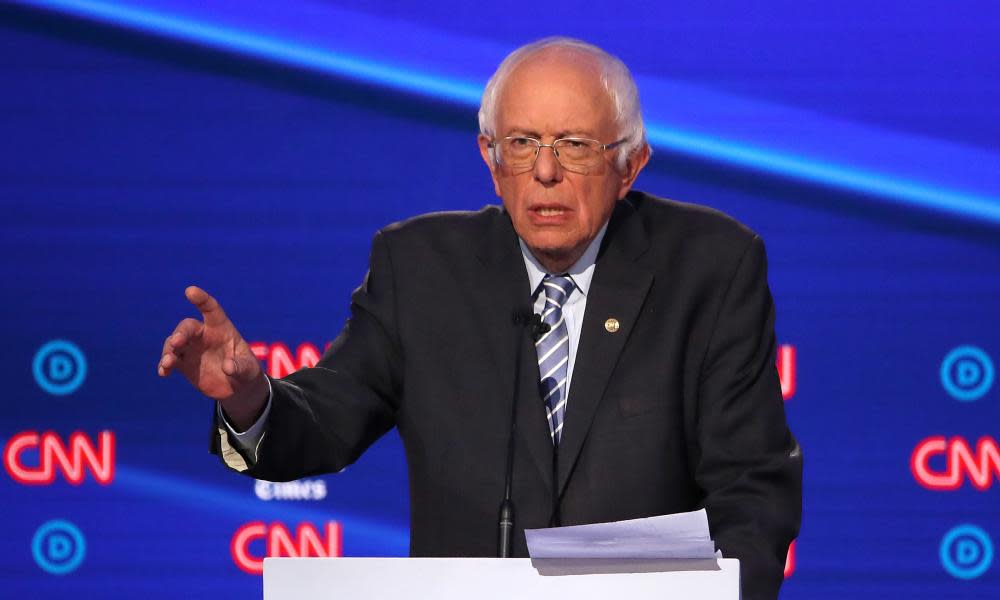Some want to write Bernie Sanders off. But he proved he's still got it

If the question looming over Tuesday’s Democratic debate was “has Bernie still got it?” the answer was yes. He still had it – for the 10 minutes or so that he was allowed to speak. Even though Bernie Sanders has far more donors than Elizabeth Warren, and has consistently been among the top three candidates in the polls, he was given less speaking time than Amy Klobuchar and Beto O’Rourke, candidates who have been registering as low as 1% in polls recently.
Of course, debates are an opportunity to showcase candidates voters might not have heard of, so CNN might say it was trying to allow some time for bottom-tier candidates to shine. But other than the silencing of Sanders, speaking time was almost exactly in proportion to poll numbers: Warren, leading the polls, got far more than anyone else, Biden second, with Tulsi Gabbard and Tom Steyer at the bottom. No, they were just ignoring Sanders. He was skipped entirely on questions about gun control and drug companies, then brought in to answer a question about his age and health. It’s well documented that Sanders’ media coverage never matches his popular support, and last night’s debate was a very clear example of the phenomenon in action.
Fortunately, Sanders used the time he did get to his advantage. He gave powerful, succinct summaries of his vision for the country. He repeatedly brought up climate change unprompted, even though (shockingly) the debate moderators seemed to have no interest in the issue. He gave a solid answer to an inane final question about bipartisan friendships, pointing to the legislation he had passed by working with Republican colleagues (and highlighting the little-acknowledged fact that he has a strong record as a pragmatic legislator).
The debate revolved around Warren, however. She proved masterful at explaining economic policy ideas clearly within the space of 20 seconds or so, including an excellent point about why it’s important to tax wealth rather than income, an introduction to the work of the Consumer Financial Protection Bureau, and a clear summary of why monopolies are harmful (a line about being the umpire while serving on the team). Joe Biden, Klobuchar, and Pete Buttigieg all came after her aggressively, and she parried them well. Klobuchar and Buttigieg appear to have settled on a strategy of directly attacking the more progressive candidates over their “unrealistic” plans – and then having the audacity to call for civility and the putting aside of differences.
Related: Who won the Democratic debate? Our panelists' verdict
Kamala Harris put in an unexpectedly underwhelming performance. Her eyes gleamed when she was asked whether she would put drug company executives in jail. (Jail, you say? I’ll put anyone in jail!) She confronted Warren with a bizarre demand to call for the suspension of Donald Trump’s Twitter account, which Warren wisely rebuffed. Harris has generally been doing worse than some of us expected, possibly because she has no clear platform and is incapable of honestly accounting for her atrocious record.
Julian Castro and Gabbard each performed one useful function at the debate. Castro brought up the fact that police violence is part of gun violence, and should be discussed accordingly. Gabbard challenged Mayor Pete over US military presence in the Middle East. Cory Booker spent a disproportionate amount of his speaking time offering variations on “Can’t we just get along?” and pleading with his fellow candidates for unity against Trump. O’Rourke was typically nondescript, but had an entertaining spat with Buttigieg over gun policy. Andrew Yang continued to plug his signature universal basic income policy, and Steyer used his first debate appearance to tout his record of advocacy on impeachment and environmental issues.
The topics of the debate were less frustrating than usual, despite the question about “unusual friendships” in place of a question about climate change, and the complete lack of attention paid to immigration, one of the most urgent issues of the Trump era. Though it seems to now be a rule that a substantial portion of any Democratic debate must be devoted to arguing about whether Medicare for All will raise middle-class taxes, this debate mercifully spent slightly less time on that question than previous ones. The first question, about impeachment, was merely an opportunity for grandstanding and finger-wagging at the president, but questions about antitrust policy, court-packing, drug companies, a federal jobs guarantee, and women’s reproductive healthcare were all substantive and useful. As much as one may loathe the political media, these debates are not completely detached from the policy issues that will affect people’s lives, and there is something of a healthy democratic spirit to them, even if candidates are given far too little time to speak in any depth on any single issue.
As usual, there were no giant revelations, no campaign-ending or star-making moments. Buttigieg and Klobuchar will probably be considered to have had “good nights”, but that is largely because they were allowed to speak for longer periods of time than their public support warrants. The main takeaway from the night was: Bernie is back in action, and with new endorsements from Alexandria Ocasio-Cortez, Rashida Tlaib, and Ilhan Omar reported during the debate, it’s clear that those who hope to see his campaign flounder are not going to get their wish.
Nathan Robinson is the editor of Current Affairs and a Guardian US columnist

